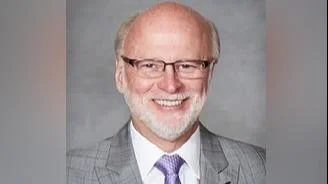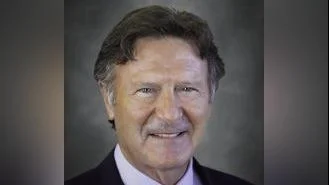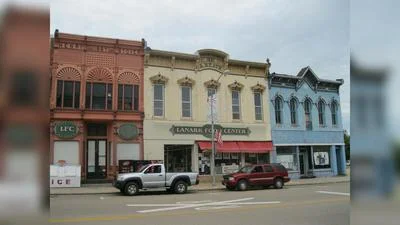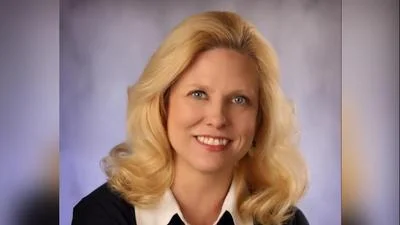State Sen. Li Arellano Jr. (R-Dixon) calls the Illinois General Assembly’s fall veto session the “worst of his lifetime” for rural areas, citing higher energy costs, cuts to road funding and threats to public safety. | https://www.arellanoforsenate.com/meet-li-arellano
State Sen. Li Arellano Jr. (R-Dixon) calls the Illinois General Assembly’s fall veto session the “worst of his lifetime” for rural areas, citing higher energy costs, cuts to road funding and threats to public safety. | https://www.arellanoforsenate.com/meet-li-arellano
The Illinois General Assembly’s fall veto session marked a historic setback for rural communities, according to State Sen. Li Arellano Jr. (R-Dixon), who cited higher energy costs, cuts to road funding and policies he believes will further erode public safety.
Lawmakers concluded the session in the early hours of Halloween morning, adjourning at 4:28 a.m. after a marathon week of legislative action that Republicans say will drive up costs, weaken public safety and drain downstate resources to bolster Chicago-area transit and progressive priorities. The session produced a sweeping energy package, a contentious overhaul of transportation funding, and a hotly debated immigration-enforcement bill, all drawing intense criticism from GOP lawmakers across Illinois, including Arellano.
“For rural Illinois, it was the worst veto session of my lifetime, and maybe one of the worst in the history of the state, because we got hit with higher energy bills,” Arellano told NW IL News. “They continued on a path that causes local or rural energy production shutdowns in natural gas and coal, which are a lot of jobs. They raided our road funds, and our cost of living is going up while our job opportunities are going down.”
At the center of the controversy is an expansive “Energy Omnibus Bill” that removes caps on consumer rate increases and gives regulators greater latitude to approve utility hikes without direct oversight.
Critics warn the changes could lead to an estimated $8 billion statewide increase in power bills while reducing local control over industrial-scale battery storage projects.
Arellano placed the bill at the top of his list of concerns.
“I think the number one thing to talk about was that energy bill,” he said. “They lifted the consumer caps. Consumers are paying more to subsidize wind, solar, geothermal, and battery storage. Some of that money will be going to some of the richest corporations in America, as Illinois essentially has to bribe some of these big companies to come produce battery storage because it's not worth doing it without guarantees.”
He said the policy shift even sparked pushback from some Democrats.
“The majority party said we're going to make ratepayers guarantee those funds, which is why there was bipartisan opposition,” Arellano said. “There were Democratic votes against that bill for precisely that reason: people are getting hammered with costs, and we're raising the cost.”
State Sen. Chapin Rose (R-Mahomet), speaking shortly after adjournment, also blasted the legislation in a Facebook video taken on the Capitol steps before sunrise noting “Democrats raised your power bills.”
Another major flashpoint was the reallocation of motor-fuel sales tax revenue. The measure diverts 85 percent of those dollars to a new Northern Transit Authority to stabilize operations at the Chicago Transit Authority.
Downstate and suburban areas will receive just 15 percent, a change opponents estimate could strip rural communities of up to $500 million in road and bridge funding.
Arellano warned the consequences for his district will be severe.
“The Democrats couldn't agree how to tax us because they passed so many taxes already that everybody was scared, from the governor to House leadership to Senate leadership,” he said. “Illinoisans are fed up with the cost of living and how expensive the state is, and their compromise was to sweep road funds, over a half a million a year, into public transit, only about $140 million of which comes back from those formulas to rural areas for rural transit.”
He explained how this funding decision would directly impact local infrastructure and jobs in his district and other rural areas outside of Chicago.
“We're looking at a net loss of over $400 million in funds for road work, bridges and related projects,” Arellano said. “Those are construction jobs leaving rural Illinois. So we're going to get worse roads, worse jobs, and a worse economy, all while being hurt by Chicago's control.”
Arellano said even Chicagoans did not benefit from the week’s actions.
“For the Chicago area, I would give it a D because they're getting a bunch of money from the rural areas for their transit, but they didn't get true transit reform to make it more affordable and better run in the long term,” he said. “They also didn't get true cooperation on law enforcement to have a safer Illinois. So even though their legislators are going to tell them it was great for Chicago, I think it was actually, in the long run, bad for Chicago as well.”
Lawmakers also approved House Bill 1312, which bars civil immigration arrests inside Illinois courthouses and within 1,000 feet of their entrances. The law also allows residents to sue immigration officers who violate constitutional protections.
The bill was passed in response to recent federal immigration enforcement effort Operation Midway Blitz, a Department of Homeland Security (DHS) and Immigrations and Customs Enforcement (ICE) initiative responsible for roughly 3,000 arrests in the region over the past two months.
Democrats framed the bill as a necessary safeguard amid stepped-up federal enforcement operations in the Chicago area.
But Arellano called the bill a dangerous political stunt that defies federal law and worsens Illinois’ immigration challenges.
“We've been incentivizing illegal immigration, and now we brought in this big influx, while simultaneously telling the feds we're not going to work with them to fix it,” Arellano said.
His comments come amid an estimated 600,000 illegal immigrants settling in Illinois.
“There's criticism about the fed methods, when they're only even here at this scale because Illinois refuses to work with them at the local and state level,” Arellano said. “Instead of saying we made a mistake and that we need to bring local and state voices and law enforcement into this task force to control immigration and have lawful entry, they doubled down. Not only are we going to continue to not do that and continue to try to pick a fight with the federal government over federal laws, but we're going to try to do what will probably be ruled unconstitutional by the courts and attack federal preemption.”
He said Senate leaders effectively conceded that the bill’s legal standing was questionable.
“The Senate president basically admitted that on the Senate floor, saying, ‘look, this very well might get struck down, but we're gonna try,’ which is the wrong attitude to take towards constitutionality, quite frankly,” Arellano said.
He also criticized the state’s failure to coordinate with law enforcement, arguing that more effective action could have prevented ongoing problems.
“The best action they could take, which is to repeal all or part of the Trust Act and get state and federal law enforcement working together again, they don't want to do that,” Arellano said. “So no, the state continues to be broken. They're passing it off on the hope of civil lawsuits, which will not work.”
State Rep. Chris Miller (R-Charleston) was even more direct, saying the bill, one of among many “horrible bills,” amounted to “more protections for illegal immigrants.”
“Their hate for President Trump is making Illinois less safe and costing taxpayers billions- it's an insult to every Illinois citizen,” Miller said on Facebook.
The session also advanced proposals to legalize assisted suicide and to decouple Illinois from key federal tax relief provisions benefiting small businesses, moves Republicans say will further raise costs and drive jobs out of the state.
Arellano said such measures reflect a broader pattern insisting the legislation advances a political ideology while weakening local control, raising costs and undermining public safety.
Arellano represents the 37th District in North and Central Illinois, which includes all or parts of Lee, Bureau, Henry, DeKalb, Ogle, Rock Island, Whiteside, Stark, Peoria, Woodford and Marshall counties.






 Alerts Sign-up
Alerts Sign-up